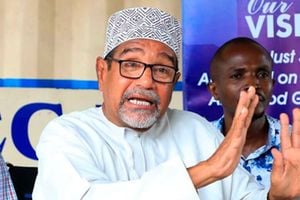
On Monday, February 17, 2025, Bomet High Court Judge Julius Kipkosgei sentenced Bernard Kipkemoi to 150 years in prison for killing his children.
Bwanadi Omar, a fisherman whose days were spent casting nets into the endless blue, found himself entangled in the net of law and fate when his wife innocently gave him out to the detectives investigating the gruesome murder of a local area chief in Lamu.
The area chief, Mohamed Shee, had just been murdered, prompting detectives to be deployed to Mbwajumali Village in Lamu East to hunt down and apprehend those responsible for his death.
Corporal Kiplagat Noah led the team investigating the chief’s killers and the motive behind his murder, which occurred on June 10, 2016, in broad daylight, albeit within a thicket that the local chief used as a shortcut to his office.
The officers visited Mbwajumali Dispensary, where the chief’s body had been moved, and upon observing, they discovered that the body bore deep cuts on the neck and head, as well as defensive wounds on his hands.
The team returned to the scene to gather more evidence, collecting blood samples from the soil and retrieving a blood-stained cap.
They managed to arrest Omar’s accomplice, Abdi Ali Mohamed, based on intelligence indicating his involvement in the murder. The following day, June 11, investigations led the officers to Omar’s house.
There, they recovered two blood-stained machetes hidden in a corner of the house, tied together with a black rubber string. They also found a pair of shorts and a blue and white blood-stained t-shirt and vest.
Omar’s wife, Hadijah Omar, was present at the time and signed the inventory of the items recovered from their house.
It was during interrogations that Ms Hadijah unknowingly unravelled a thread that sealed her husband’s fate.
The woman told the investigators that her husband had worn the recovered clothes the previous day.
Her words were a revelation so simple, yet so damning, spoken without malice or foresight, became the tide that swept Omar away.
That is how Omar was arrested.
“We arrested Omar and booked him at the police station. After further investigations, I concluded that Omar had a grudge against the chief after their conviction in 2015 for cutting their neighbour’s cow, as it was the chief who had reported the matter to the police,” Mr Noah told the trial court during the hearing of the murder case against Omar and Abdi.
He stated that the chief was killed approximately 200 meters from his office.
The two were not fortunate, as a fellow fisherman also hit the last nail in their coffin.
Mr Athman Shamina told the trial court that on the morning the chief was killed, he encountered Omar and Abdi on the way while he was coming from his hustle.
“It was around 9am, they were walking very fast in the bush. Fifteen minutes later, I learned that the chief had been killed,” he told the court, adding that he proceeded to the scene, where he found the chief lying dead.
His testimony was corroborated by a minor who also saw Omar and Abdi running from the forest toward the village.
He was, at the time, on his way to fetch water from the ocean to use in the school’s toilet.
“I saw them running from the forest. I later heard that the chief had been killed and saw people streaming toward the forest. I know the two since we come from the same village,” said the 15-year-old schoolboy.
Mwana Halima was the last to see the chief alive.
She told the court that she met the chief 100 meters from the spot where his lifeless body was found.
“The chief was alone. I inquired about my brother’s birth certificate, but he asked me to call his house and pick up the document,” she testified.
She did just that and was handed the documents, but less than half an hour later, she received the news of the chief's death.
The chief’s son, Mohamed Shee Mohamed, testified that his father left home for work between 8:15 and 8:30am on the day in question.
“I later received information that my father had been killed. I visited the scene and confirmed the sad news,” he told the court.
Mohamed explained to the trial court that the shortcut was his father’s usual route to his workplace, as he routinely used the path through the forest.
The chief's neighbour, Amina Abushiri, explained to the court that on the night before the murder, her parents’ cow had been cut.
“The chief passed by our home the next day to view the cow. He then contacted the police to report the incident and requested that we record a statement with them before leaving,” said the witness, adding that she later heard the chief had been killed.
Dr Mohamed Kombo of Lamu County hospital, conducted the post-mortem on the body and concluded that the chief had experienced excessive loss of blood and that he died due to severe haemorrhage.
“The weapons used had a sharp cutting edge, the cuts seemed to have been simultaneous, there must have been more than one attacker,” said the medic.
DNA analysis conducted on the items recovered from the suspect did not generate profiles of Omar and Abdi.
Government Chemist George Ogunda explained that this was possibly due to exposure to a harsh environment.
“The blood stained Muslim cap generated a male DNA profile, which did not match that of the blood samples provided by Omar and Abdi,” he explained.
Omar and Abdi denied their involvement in the chief murder but did not provide much to counter the evidence presented by the State.
Omar, for instance, confirmed that the exhibits were recovered from his house but denied ownership of them.
“There were many members of my family living together in the house,” he said, adding that the DNA examination results were negative and did not connect him to the offence.
Abdi merely stated that he was awakened from sleep by his sister’s son, who informed him of the chief’s death.
“I visited the scene and was arrested due to my disagreement with my brother-in-law. The exhibits were not linked to me,” he said.
In 2020, Justice Lagat Korir convicted the two and sentenced them to 28 years each.
However, they filed an appeal to the Court of Appeal, primarily arguing that the offence of murder was not proven against them as required by law since the exhibits presented in court did not scientifically link them to the offence in question.
But three appellate court judges, Dr Kibaya Laibuta, Ngenye Macharia, and George Odunga, reached the same verdict, dismissing the appeal as lacking any substance to justify the suspension of the 28-year jail terms imposed on the two convicts.
“We reach the inescapable conclusion that the appeal lacks merit and is hereby dismissed,” the judges said in a judgment delivered on November 8.
The judges reviewed the evidence and concluded that the only reasonable inference was that Omar and Abdi were responsible for the murder as charged.
For now, the fishermen, Omar and Abdi, have left the gentle rhythms of the ocean behind for the harsh clang of prison gates.











